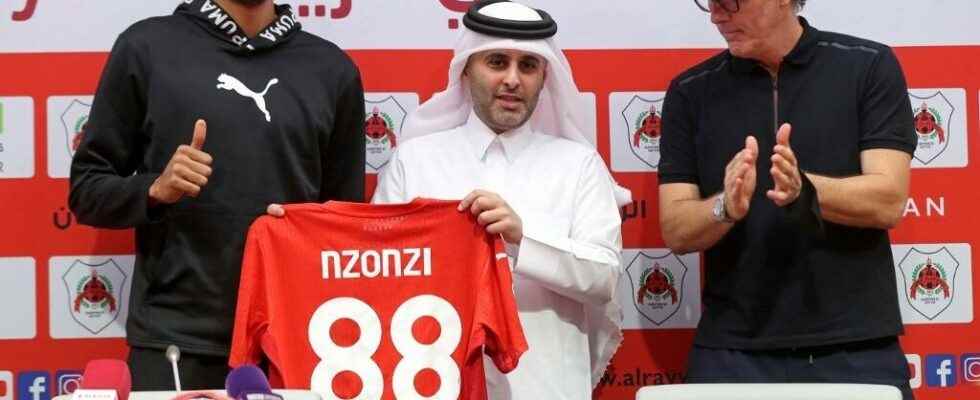For a decade, Qatar has attracted major players in football for the 2022 World Cup. Players and coaches have succeeded each other in the clubs to develop the national championship. Today, we are wondering about the post-World Cup and the place of football. This diplomacy of soft-power will it still be used?
” Qatar is a very pretty country, less pretty at the moment, because there are a lot of big construction sites and development work. It’s a very open country, a little less than Dubai, but still open. There aren’t as many restrictions as you might think “, tells RFI the Brazilian Rafael Ramazotti, who plays in the second division at Muaither SC.
The peninsula began to attract more renowned foreign players and coaches when Fifa, in December 2010, to everyone’s surprise, awarded the 2022 World Cup to this small emirate in the Middle East, a producer of gas and oil, populated by about 2,500,000 inhabitants on an area of 11,500 square kilometers, slightly larger than Corsica. Since then, dozens of players have checked off the destination of this Arabian Peninsula, known for its futuristic skyscrapers, and its lucrative contracts.
Big salary and golden life
” In my club, there is a former Liverpool player, one from Olympique de Marseille, another from MLS (United States) and a Ghanaian internationaltestifies Rafael Ramazotti. After Gibraltar, I had the option of signing in Dubai or Qatar. The contract was more financially interesting with Qatar “.
Recently, Colombian international James Rodriguez drew a line under his career in Europe at the age of 30. He had settled down in September 2020 at Everton in England after six years at Real Madrid. Once again, Qatar offers itself a new recruit of choice to publicize its championship, unknown to the general international public.
Doha has also attracted former glories to the benches of Qatari clubs. Before leading FC Barcelona, the former Catalan international Xavi, played and then coached in Qatar. Other Spaniards, Pep Guardiola, who joined Al Ahli Doha from 2003 to 2005 or Raul, from Real Madrid, who signed with Al Sadd in 2012.
Laurent Blanc, aged 56, world champion in 1998 and European champion in 2000 with the French team as a player, had his first coaching experience abroad in Qatar after passing through the Paris Saint Germain. The one who had in his ranks the French world champion Steven Nzonzi, former Stade Rennais midfielder, James Rodriguez or the Algerian Yacine Brahimi, was sacked by Al Rayyan last February for lack of results, despite costly recruitment .
Succeed in normalizing the image of the country
” The place of football has long stirred the circle of power in Qatar. The more traditional branch did not want the World Cup at the risk of getting into trouble. Today, if Qatar manages to manage its World Cup without too much controversy, the leaders will succeed in normalizing the image of the country. Qatar’s interest is to continue its soft power through sport and especially football “, explains to RFI Akram Belkaïd, journalist at Diplomatic world. It must be said that NGOs like Human Rights Watch or Amnesty International strongly criticize human rights in Qatar since the work of the World Cup began.
Let us remember, in 2017, Saudi Arabia, the United Arab Emirates, Bahrain and Egypt had imposed an economic and diplomatic embargo on Qatar, judged in particular to be too close to Iran. ” At the time of this embargo, Western voices came to defend Qatar. This thanks to the soft power of the Qataris “, specifies Akram Belkaïd, indicating that the purchase of Paris Saint-Germain remains “ a great showcase for Qatar “. He adds : “ In the salons of the Parc des Princes, we receive very influential people. It’s not just bling. PSG is a great public relations tool for Qatari power “. Like Manchester City, which has belonged to the United Arab Emirates since 2008. But what about on the spot?
Social lift for the sons of immigrants?
In 2018-2019, Frenchman Christian Gourcuff returned fifteen years after training in Qatar. ” There is no one at the stadium. Except when it’s the national team. But in the league, it’s ridiculous. We were playing in front of 30 people. Matches are televised, people stay at home because of the heat “, he explained to SO FOOT. “ After the World Cup, which is a vast communication operation for Qatar, I wonder what all this will lead to. It’s artificial… I don’t see any prospects “, also declared Christian Gourcuff.
” It’s true that here, like in Brazil, you don’t find local players who need football to get by like I did. You don’t find people who are hungry and run away with football. But the level of the championship is interesting “says Rafael Ramazotti, joined by our Portuguese-speaking editorial colleague Marco Martins.
In Qatar, many sons of immigrants hope for a Qatari passport by succeeding in football. This is one of the motivations of these young players who know that they will obtain the privileges of Qatari society by being naturalized. About 80% of the inhabitants of Qatar are foreigners. The thousands of migrant workers, mainly domestic workers or on construction sites, are far from having the same advantages as Qataris. Naturalizations in the Arab countries of the Gulf are extremely rare. The road to citizenship is very long.
” The sauce does not manage to take and the Qatari youth has not started playing football. The youth in Qatar is not sporty, it is not really in the culture. There is now a public health problem in the face of the sedentary lifestyle of young people. But Qatar will keep its championship, even if it is not a driving force for its youth “says Akram Belkaïd.
